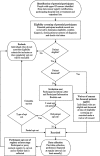The Upper Gastrointestinal Cancer Registry (UGICR): a clinical quality registry to monitor and improve care in upper gastrointestinal cancers
- PMID: 31575580
- PMCID: PMC6773358
- DOI: 10.1136/bmjopen-2019-031434
The Upper Gastrointestinal Cancer Registry (UGICR): a clinical quality registry to monitor and improve care in upper gastrointestinal cancers
Abstract
Purpose: The Upper Gastrointestinal Cancer Registry (UGICR) was developed to monitor and improve the quality of care provided to patients with upper gastrointestinal cancers in Australia.
Participants: It supports four cancer modules: pancreatic, oesophagogastric, biliary and primary liver cancer. The pancreatic cancer (PC) module was the first module to be implemented, with others being established in a staged approach. Individuals are recruited to the registry if they are aged 18 years or older, have received care for their cancer at a participating public/private hospital or private clinic in Australia and do not opt out of participation.
Findings to date: The UGICR is governed by a multidisciplinary steering committee that provides clinical governance and oversees clinical working parties. The role of the working parties is to develop quality indicators based on best practice for each registry module, develop the minimum datasets and provide guidance in analysing and reporting of results. Data are captured from existing data sources (population-based cancer incidence registries, pathology databases and hospital-coded data) and manually from clinical records. Data collectors directly enter information into a secure web-based Research Electronic Data Capture (REDCap) data collection platform. The PC module began with a pilot phase, and subsequently, we used a formal modified Delphi consensus process to establish a core set of quality indicators for PC. The second module developed was the oesophagogastric cancer (OGC) module. Results of the 1 year pilot phases for PC and OGC modules are included in this cohort profile.
Future plans: The UGICR will provide regular reports of risk-adjusted, benchmarked performance on a range of quality indicators that will highlight variations in care and clinical outcomes at a health service level. The registry has also been developed with the view to collect patient-reported outcomes (PROs), which will further add to our understanding of the care of patients with these cancers.
Keywords: biliary cancer; clinical registry; database; gastric cancer; liver cancer; oesophageal cancer; pancreatic cancer; population health; quality improvement; quality of care; upper gastrointestinal cancers.
© Author(s) (or their employer(s)) 2019. Re-use permitted under CC BY-NC. No commercial re-use. See rights and permissions. Published by BMJ.
Conflict of interest statement
Competing interests: None declared.
Figures
References
-
- Australian Institute of Health and Welfare Cancer in Australia 2019. Canberra: AIHW, 2019. 205p. Cancer series no.119.
-
- Rugge M, Fassan M, Graham DY, et al. . Epidemiology of Gastric Cancer [internet. Switzerland: Springer, 2015: p23–34.
Publication types
MeSH terms
LinkOut - more resources
Full Text Sources
Miscellaneous


